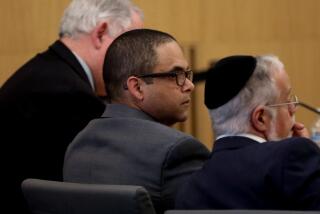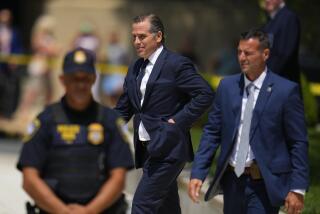Goetz Indicted on Gun Counts : Attempted Murder Charge Rejected
- Share via
NEW YORK — A grand jury on Friday refused to indict Bernhard Goetz for attempted murder in the shootings of four young men on a subway, and instead indicted him only on three counts of criminal possession of a weapon.
“What the grand jury decided here was that he was illegally carrying a pistol but he was justified in protecting himself from a robbery,” said Manhattan Dist. Atty. Robert Morgenthau, in announcing the indictment.
Goetz’s lawyer, Joseph Kelner, called the action a vindication, and said Goetz was “very pleased. It increases his sense of confidence and respect for our system of law and justice.”
Goetz, 37, who remains free on $50,000 bail, was not available for comment. Arraignment was scheduled for Feb. 6.
The indictment by the 23-member grand jury was the latest twist in a case that has drawn national attention since Dec. 22, when the four youths asked Goetz to give them $5 and he reeled off five shots instead.
Morgenthau said he hoped that the public would “read that in this case, the grand jury found justification. I hope they won’t read anything else into it. I also hope that they notice he was indicted for a felony and faces up to seven years in prison.”
The most serious charge on which Goetz was indicted carries a maximum term of seven years in prison.
Morgenthau said he could not say whether Goetz should go to jail: “That’s a matter for the courts to decide.”
Goetz had been charged by the district attorney’s office with attempted murder, but no case can be brought to trial in New York unless a grand jury indicts. If a grand jury refuses to indict, that brings an end to those charges unless new evidence is brought forward in the case.
Public officials decried the shootings, but were careful not to criticize Goetz until the courts acted. On Friday, Mayor Edward I. Koch would not comment other than to say that “I believe in the grand jury and the jury system.”
“The law is the law,” said Gov. Mario Cuomo.
Kelner said after the jury action, “This constitutes a vindication of the various acts that composed the shooting.”
“This case or any case cannot be deemed as a barometer or a signal or an indication that people should ever take the law into their own hands. We insist that Mr. Goetz did not take the law into his own hands.
“He did what was reasonable and justifiable under all the circumstances in the case,” Kelner said.
The jury indicted Goetz on one count of third-degree criminal possession of a weapon--illegally having a loaded pistol during the shooting incident.
He also was indicted on two counts of fourth-degree criminal possession of a weapon. He allegedly had two other pistols inside his Manhattan apartment on Dec. 30, when police searched it.
Third-degree weapons possession carries a maximum seven-year sentence and fourth-degree carries a maximum one-year term.
Asked for $5
The incident occurred as an IRT train approached the Chambers Street station in Lower Manhattan. Four Bronx youths allegedly accosted Goetz and asked for $5; he then reached into his coat and pulled out a .38-caliber revolver, according to police accounts.
“I have $5 for each of you,” he reportedly said, and then fired five shots, wounding all four.
About a dozen people were in the car at the time. The gunman helped two women up and spoke to the conductor, who asked whether he was a policeman.
“No. They tried to rip me off,” he replied, and then fled into the subway tunnel before police arrived.
The four men shot by the gunman were identified as Barry Allen, 19; James Ramseur, 18; Troy Canty, 19, and Daryl Cabey, 19. Cabey was the most seriously injured. Shot in the chest, he was paralyzed from the waist down.
He later contracted pneumonia and lapsed into a coma. Cabey remains in critical condition, and doctors say neurological tests have indicated that his upper brain functions--involving comprehension and speech--were impaired.
Three of the four youths were carrying screwdrivers in their pockets. All had police records.
The case captured the public imagination--the man on the IRT was called the “Subway Vigilante” and the “Death Wish Gunman,” a reference to the Charles Bronson movie about a New Yorker who takes the law into his own hands.
Nine days after the shootings, on New Year’s Eve, Goetz walked into a Concord, N.H., police station and told police he was man sought in the shootings. There, he gave a videotaped statement, in which he reportedly discussed the shootings.
He returned to New York on Jan. 3 after waiving extradition.
Goetz, a self-employed electronics expert, had been mugged in 1981. He had sought a gun permit, and had been refused.
A legal defense fund established by Goetz’s friends drew thousands of dollars in donations. But Goetz refused the fund’s help in posting bail, financing it himself and leaving Rikers Island jail on Jan. 8.
Since that time, he has met with lawyers planning his defense. On Thursday, they announced that Goetz would not waive immunity, and thus would not appear before the grand jury. None of the four youths testified before the panel. Since grand jury proceedings are secret, it was not known what evidence the jurors considered.
More to Read
Sign up for Essential California
The most important California stories and recommendations in your inbox every morning.
You may occasionally receive promotional content from the Los Angeles Times.













